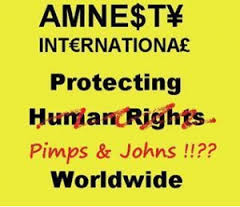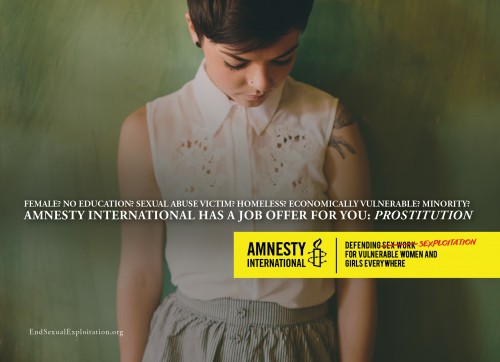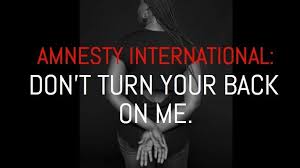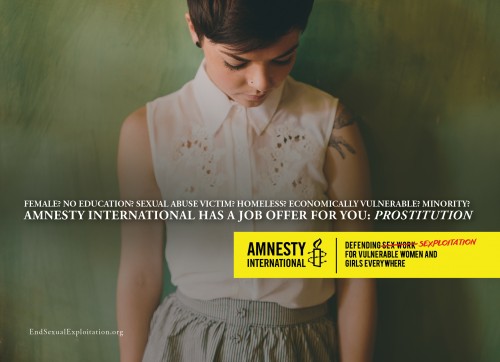On 11th August 2015, members of Amnesty International’s international council voted in Dublin to accept a radical and massively controversial policy titled, “Draft Policy on Sex Work,” in which it supports full decriminalisation of pimping, brothel owning, and the buying of sex.
People who have escaped the sex industry have stated that Amnesty’s proposal would “bestow a life sentence of sexual exploitation and rape to many around the world.”
Many people will be unaware that Amnesty International Ireland is undertaking a campaign to support the decriminalisation of prostitution. Among other things, Amnesty was accused of protecting pimps, the buyers of sex and other exploiters. Following this the #NoAmnestyForPimps hashtag was created.
When a draft of the Amnesty’s proposed policy was leaked in early 2014, many feminists and prostitution survivors were naturally shocked and condemned the proposal. Like with many of Amnesty’s policies, its own members were, in so many ways, sidelined on the issue. Members were consequently offered three weeks to provide feedback on the document, even though most members did not even receive any notification of this process.
In July 2015 an updated draft was released to Amnesty International members which was again criticised by feminist organisations, including The Coalition Against Trafficking of Women (CATW), who published an open letter signed by over 400 campaigners and organisations, condemning “Amnesty’s proposal to adopt a policy that calls for the decriminalization of pimps, brothel owners and buyers of sex — the pillars of a $99 billion global sex industry.”

Contrary to claims that decriminalisation would make prostitution a safer way of life, critics of the Amnesty proposal pointed to research from numerous countries in which decriminalisation of the sex industry had produced horrific results. For instance the German government deregulated prostitution in 2002 and has found that the sex industry was not made safer for women after the enactment of its law. In fact the massive growth of prostitution in Germany has triggered an increase in sex trafficking. These campaigners instead asked Amnesty to support the so-called Nordic model, in which sex buyers and pimps are criminalised, while prostitutes themselves are decriminalised.
According to the CATW: “Should Amnesty vote to support the decriminalization of pimping, brothel owning, and sex buying, it will in effect support a system of gender apartheid.”

Under Amnesty’s approach, prostitution would not be legalised (or made legal and then regulated). Instead it would be decriminalised, with limited government regulation.
Prostitution has been decriminalised or legalised in several countries, and the results have been shocking: Sex trafficking and criminal activities have increased. In Denmark prostitution was decriminalised in 1999 and has for instance four times as many sex-trafficking victims as Sweden. This is the case even though Sweden’s population is 40 percent larger.
The argument that Amnesty’s proposal would lead to an increase in the number of girls and women been trafficked to feed the sex industry are backed up by three studies. The World Development Paper, University of Gothenburg Study and NYU School of Law Report all three found that decriminising prostitution drastically increases the demand for prostitution by reducing the associated stigma and costs. For example, again in Denmark, the demand for prostitution rose by 40 percent in a seven-year period after it was decriminalised in 1999. As the numbers of ‘voluntary’ prostitutes cannot match the growth in demand for women, pimps resort to sex trafficking of women and girls to feed this growing demand.
Amnesty argues that decriminalising prostitution will reduce the stigma, thereby improving access to health care and allowing prostitutes to get employment contracts and form labour unions. But Amnesty’s argument is not supported by the evidence. Prostitutes in Germany, for instance, often work 18-hour days. As the stigma is reduced prostitutes also end up offering a wider range of risky services such as unprotected sex, anal sex, group sex, BDSM and acting out torture or rape fantasies. The attempts to form labour unions have failed in the Netherlands, and according to a German government study, very few prostitutes have employment contracts. All of this results in increased exploitation and abuse of prostitutes.

Amnesty also claims that decriminalisation improves prostitutes’ access to health care. Yet studies by the governments of Germany and New Zealand found no such improvement. In fact, because of the increase in trafficking and worsening “work” conditions, prostitutes’ health is likely to be at an even greater risk.
Over the past several years, the issue of ‘voluntary’ prostitutes has been subject of much debate. Prostitutes are overwhelmingly from poor and vulnerable communities. Their entry into prostitution is often preceded by a history of violence and abuse. Rape is often the first sexual experience of most prostitutes, and that a majority of prostitutes were victims of child sexual abuse. Studies have shown that sex traffickers groom their victims aimed at moving them to a dependent role. Sex traffickers use violence, substance dependency, lies and manipulation. Women who enter into prostitution do so at a very young age and while exact numbers are impossible, several controversial studies have put the average age of entry between 12 and 14; others have found that the majority entered prior to 18, and an international study found that 47 percent entered before age 18. Under the U.S. Trafficking Victims Protection Act, any minor — person under 18 — in prostitution is a victim of sex trafficking. Yet in Amnesty’s framework, regardless of a prostitute’s history of exploitation or age of entry into sex work, prostitution is considered consensual from the day she turns 18. The question is how many of these ‘voluntary’ prostitutes are really voluntary.

Amnesty’s aggressive support of the commercial sex industry feeds a rape culture by trivializing sex, weakening gender equality and treating sex as something that can bought and sold. Sex should be treated differently from other activities. It is a uniquely personal and private act. This is why we treat rape as worse than other forms of assault precisely because it is a more intimate violation.
The government prohibits a wide range of economic activity, and groups like Amnesty usually advocate for robust regulation because of concerns about labour-right violations, work conditions and abuse of workers. But in this case, Amnesty proposes a decriminalisation of an industry known to be linked to organised crime and ruled with corruption and violence and at a high risk of sex trafficking.
Amnesty’s proposal is an attack on human-rights and women’s-rights. It ignores all the peer reviewed studies in this area and the vast majority of people who have been exploited by this abusive and criminal ridden.
Amnesty has adopted a position that is supported by pimps and sex traffickers and opposed by those who have escaped the industry.
Amnesty has truly lost its way.

